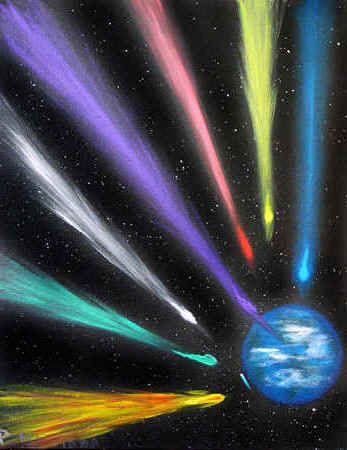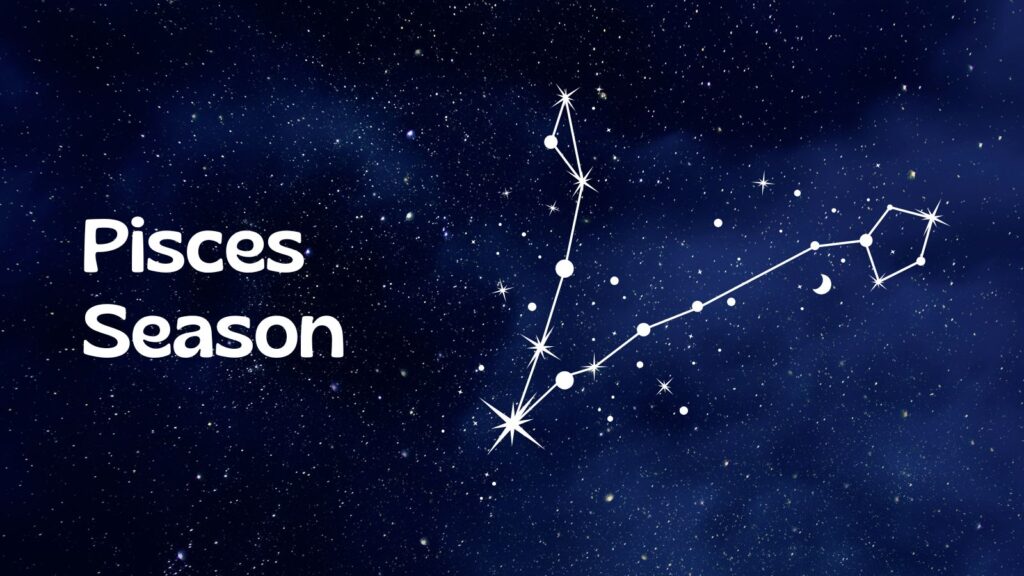Happy New Moon Everyone!
Today, some thoughts about planetary “energies.” Do planets really have energies? Can you really feel them? Have astrologers always talked about planetary “energies?” Why does it matter?
* First, it’s important to note that astrologers haven’t always agreed upon whether or not planets are signs, indicators, or omens (like Tarot cards, runes, or I Ching hexagrams), or whether they are active forces exerting some kind of causal energy (like weather patterns). In fact, this has been something of an ongoing debate for most of the history of astrology.
* What’s at stake in this debate? Well, people who suggest that the planets are causes, exerting real energies, believe that, to some extent, the ongoing predictable cycles of the planets demonstrate that there is something empirical going on with astrology’s predictive powers. Because the planetary movements are able to accurately predict a huge variety of different events and themes (both inner and outer), they must be participating in some kind of causal dynamic. In fact, as long ago as the first centuries of the common era, astrologers have hypothesized about the way in which the planets might be literally causing things to happen. For example, many early astrologers believed that the Moon, being a reflective light, captured the lights of the other planets and then disseminated the light through the subtle elemental spheres (fire, air, water, and earth), which in turn stimulated all different kinds of changes and mixtures of the elements, which in turn created the gross changes we see here on planet Earth (from weather to mundane events or personal events). Today, though we use words like “energy,” astrologers from bygone eras similarly used words like “rays” or “light,” in order to convey the idea of the planets actually emitting something and creating or causing various kinds of changes.
* Today we find people still hypothesizing all the time, through the incorporation of ideas from quantum physics and morphogenetic field theory, among many other things, and thus basically making the same argument: “the planets are causal agents and they are affecting us and affecting changes of all kinds, all the time.”
* The main reasons that people are drawn to or prefer these kinds of explanations is that they feel that astrology should be respected as a kind of science, or that the effects of an astrological transit are in some ways demonstrable or empirically verifiable. Or, perhaps just as important, people feel that by seeing the planets as affecting us on an energetic level, our free will is more integral or important. The argument goes like this, “if the planets are exerting energies upon us, then we have to interact with or respond to those energies with our free will.” Let’s draw a comparison with the daily weather. If it’s raining outside, it may affect your mood or it may affect your walk to the post office, but because you have free will, you could also choose to adjust your mood. You may recognize that it’s raining and that you’re feeling dreary, and so you may listen to an upbeat song and try to lift your spirits despite the “influence” of the weather. Or, you might choose to drive, rather than walk, to the post office. Because we value freedom, individuality, and the idea of a somewhat, if not totally, open future (ours to create!), the idea of the planets as causal agents, as energy fields or influences, is very appealing to us. Who could blame anyone for wanting to have some participatory role to play in their day to day lives, let alone the cosmos itself!
* Another reason, a more social reason, that people often prefer astrological causality or the conceptualization of the planets as literally exerting some kind of influence upon us, is that we want to be taken seriously by the “scientific” community, or, at least, we don’t want to appear like there isn’t a high degree of intelligence or intellectual sophistication to the students, practitioners, or study of astrology. Referencing quantum physics, energy fields, or neuroscience, lends an aura or mood of “credibility” to astrologers and astrology.
* Similarly, some people who may not want to go so far as to claim that the planets have some literal/energetic influence will claim that astrology is an artistic or symbolic language, based on the movements of the planets, or that is more like a psychological tool or artform, a cultural/imaginative artefact that engages something very deep in the human spirit, which may aid or assist in the creation of meaning in life, and who could suggest THAT isn’t a worthwhile activity? In this line of reasoning, astrology is not so different from the work of writers, filmmakers, actors, musicians, poets, etc.
* All of the above may or may not be true. I do not pretend to have the answers, and I am open to being wrong; after all, we are standing on shaky ground if we are more afraid of being wrong than we are eager to learn the truth. However, I personally believe that the planets are signs, omens, or indicators, not unlike Tarot cards or runes or I Ching hexagrams, and I’ll try to explain why.
* The simplest reason I believe that the planets aren’t causing things to happen but rather signifying or describing what is happening is that I see the sky as more of a mirror than series of forces acting on us. This isn’t to say that there aren’t forces acting on us, within us, and around us all of the time. It’s only to say that, to me, those forces are too many, too complex, and generally speaking too subtle to assign to factors as simple or monolithic as the planets. This isn’t to say that the planets may not have energies or energetic effects. It’s more generally to say that the planets’ powers, or the power of the language of astrology in general, signifies a huge and complex range of forces that we mostly pretend to understand when we make declarative statements about how astrology “works.” To me, seeing the sky as a mirror, and seeing the planets as omens, signs, or indicators, simply feels more honest and reverential. After ten years of regularly altering my consciousness in ayahuasca ceremonies, I feel comfortable saying that there are innumerable levels of material reality with innumerable material forces, flowing and changing constantly, and they are operating in ways that are largely beyond the limits of our minds to understand, predict, or map out, especially when it comes to their role in human/earthly destiny. However, my experiences with ayahuasca also convinced me within the very first hours of my very first experience, that signs, omens, and symbols, have the power to capture, describe, organize, interpret, or instruct us with regard to the workings of the innumerable and complex forces that are at work in our lives and within our environments.
* In the Bhagavad Gita, for example, Krishna says that karma is deeply mysterious and that not even the wisest sages understand the workings of karma (karma being action and reaction, or action and the outcomes of actions). I agree.
* In my mind, it’s not that science is a waste of time. It’s that science is, itself, a kind of symbolic activity. The language of science is itself a language of symbol. It is oracular. As C.S. Lewis once wrote, “But nature gives most of her evidence in answer to the questions we ask her. Here, as in the courts, the character of the evidence depends on the shape of the examination, and a good cross-examiner can do wonders. He will not indeed elicit falsehoods from an honest witness. But, in relation to the total truth in the witness’s mind, the structure of the examination is like a stencil. It determines how much of that total truth will appear and what pattern it will suggest.”
* The trick is to remember that the “total truth” we inquire about is infinitely expanding, infinitely new, and cannot be circumscribed by the mind. The total and highest truth desires a relationship with us and can only reveal itself to us within the context of the heart that has surrendered itself to it. From that surrender comes the intelligence needed to continue moving into and becoming closer with the truth that is ever new and ever-expanding, faster than light, faster than material reality, and faster than the speed of the mind.
* Similarly, in the Bhagavad Gita, Krishna says that the perfection of analytical study leads one to surrender the heart to the divine. He also says that when one surrenders in devotion and service to the divine, he naturally reciprocates by giving one higher intelligence.
* So, although our symbolic language of astrology is rooted in math, astronomy, and some recurring, physically describable and predictable “scientific” language, I personally believe that the planets are signs, omens, and indicators of forces that are too many, too complex, and even beyond the literal/physical planets themselves. To that end, I don’t believe astrology comes from observation and experimentation but rather from higher, transcendental intelligence that was given to/received by ancient sages. I don’t believe that we can therefore easily sit down and discuss “how it works” from an analytical perspective, or even reverse engineer astrology down to some easy core principles that tidily explain how it has the power to accurately predict or describe our lives. To do that, at the very least, we would have to stop talking about scientific theories, no matter how progressive, and start insisting that meditation and mind/body practices be an essential part of astrological inquiry (alongside any mental disciplines).
* Similarly, I believe that the fascination with astrological history or theory that is devoid of any interest in the consciousness of ancient astrologers or the consciousness that could have produced the language of astrology is mostly fruitless.
* When people suggest that astrology is merely an art form or an antiquated, psychological language that may assist us in the ultimate modern project of meaning-making, what I hear is a kind of post-modern nihilism or empiricism cloaked in the love of literature or the arts or of academia.
* There are practical reasons I believe this position (planets as signs/omens/indicators) to be beneficial for us astrology geeks, as well. For one thing, I can’t tell you how regularly I hear people say, “Saturn is kicking my butt,” or “this energy is really draining me.” The problem with this language is that it frequently encourages a distorted view of ourselves and of reality. From the perspective of planets as signs or omens, Saturn isn’t doing anything to you. Saturn is simply reflecting things that are going on inside of you and in your life here on earth. If you want to get to the source of those things, you usually have to look inward, or you need some common sense, or you need to survey your immediate environment and do some healthy discerning or critical thinking. Similarly, it’s rarely that the energy is draining you as much as it is that you aren’t getting enough sleep, you aren’t eating or exercising, you are taking substances into your body that aren’t healthy, you aren’t maintaining healthy boundaries, etc. If the upside of the planets as energies is that we can “work with them as influences,” then the downside is that we can also blame them as influences rather than recognizing the impact of our own thoughts, feelings, emotions, and choices.
* But what about this idea that we can and should be working with the influences of material nature, in general? Isn’t that worth salvaging somehow? Yes! Of course! The planets may still signify or symbolize different kinds of forces, and we are still conscious agents with free will, it’s just that a planet isn’t the sole force itself as much as it is describing different kinds of forces in different areas of our lives, at different times, that we may be contending with or interacting with.
* Planets also describe fate. Some things aren’t about influence, they are about destiny.
* We should also remember that one of the earliest and most common philosophical motivations for doing astrology in the first place was that by using the “stars of the Gods” as omens saying something about the “fate or destiny” of the native, both the student of astrology and the client, may come closer to accepting with equanimity the field of fate/karma into which one is born. This acceptance of fate is likened unto a kind of spiritual liberation within numerous mystical traditions that were popular at the time of astrology’s advent.
* So perhaps the biggest benefit of seeing the planets as signs and indicators, wandering objects moving in fixed, tight, rhythmic, predictable, and cyclical circles, is the reminder that real freedom isn’t found in manipulating influences within ever-repeating circles, but rather it’s found in the consciousness that sees itself both within but ultimately beyond these cycles and circles. We ourselves, our lives, our egos, our activities, become symbols, omens, or signs. And the single greatest influence we have is the one that has us, that wants us, 24/7, without fail…the influence that is inviting us back home, back into our hearts, into a happiness that knows no limits, that is equal in happiness and distress, that walks its fate with indescribable gladness, and that surprises the world with the freedom of an unspeakable intimacy.
Prayer: Show us the signs of your glory, wonder, and love. Influence us.
*Want to see the video blog version of this horoscope? Check out my youtube channel here.













